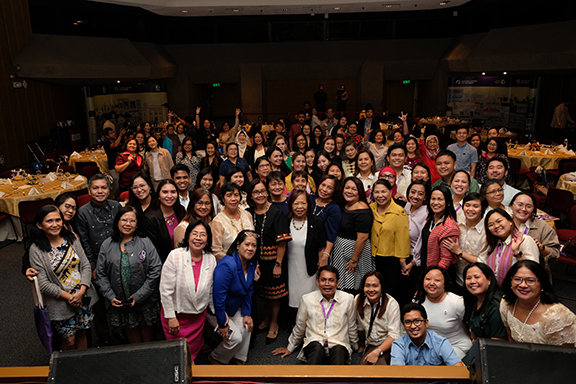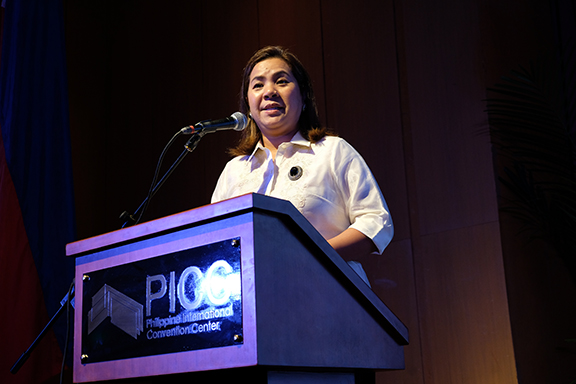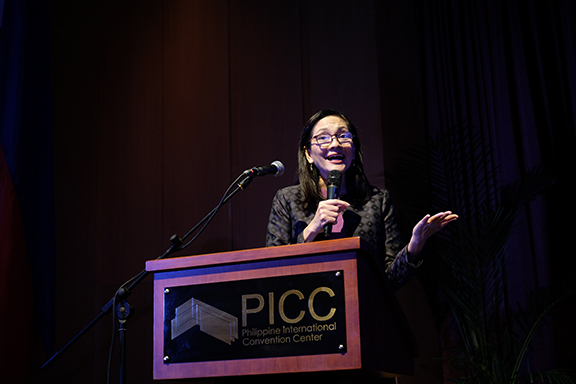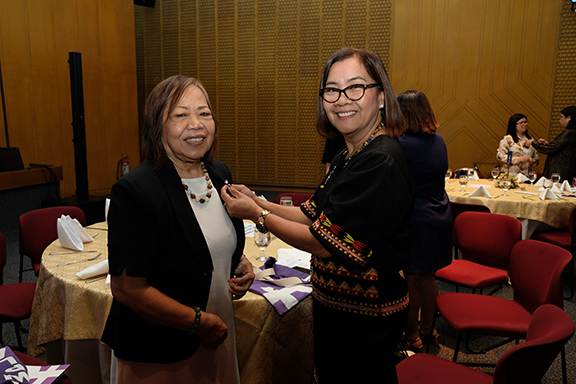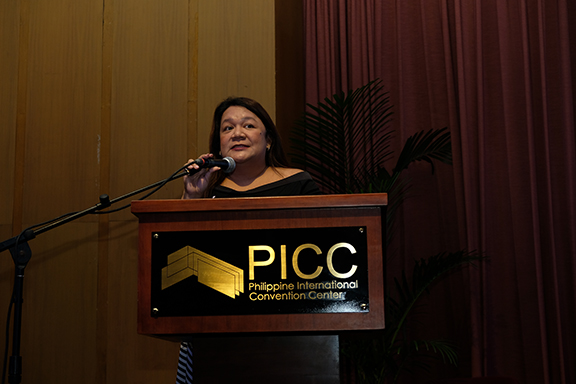PCW launches priority agenda for 18th Congress
“Bakit Mahalaga ang Agenda ni Juana?”
This question was posed during the launching of the Women’s Priority Legislative Agenda (WPLA) for the 18th Congress on September 27, 2019 at the Philippine International Convention Center, Pasay City.
Organized by the Philippine Commission on Women (PCW), the event was attended by over 100 participants from national government agencies, civil society organizations, and the academe from Luzon, Visayas, and Mindanao.
The WPLA seeks to amend or repeal discriminatory provisions of existing laws and support new legislations that promote, protect, and fulfill women’s rights.
In her opening remarks, PCW Deputy Executive Director Maria Kristine Josefina G. Balmes stressed the significance of the women’s agenda, citing that despite achievements in pursuing laws for women and gender equality, persistent discrimination, exploitation and violence against women still persist.
“Today, we celebrate our solidarity. Today, we unite and signify our commitment in ensuring that the Agenda ni Juana is heard through the enactment of gender-responsive legislation in the country,” said Balmes.
The launching featured “Juana Talks,” patterned from the famous TED talks. Jumpstarting the talk was Senator Risa Hontiveros, Senate Committee on Women, Children, Family Relations and Gender Equality Chairperson, who vowed to elevate women’s agenda and remove gender discrimination in the legal framework.
As part of her plan to ‘walk the talk,’ she is proactively pushing for the enactment of the Anti-Discrimination Based on Sexual Orientation and Gender Identity and Expression Bill and the Dissolution of Marriage Bill, both included in PCW’s WPLA.
“This 18th Congress, we aim to pass laws that will fully empower women, stop abusive practices, and end gender-based discrimination and inequality,” declared Hontiveros.
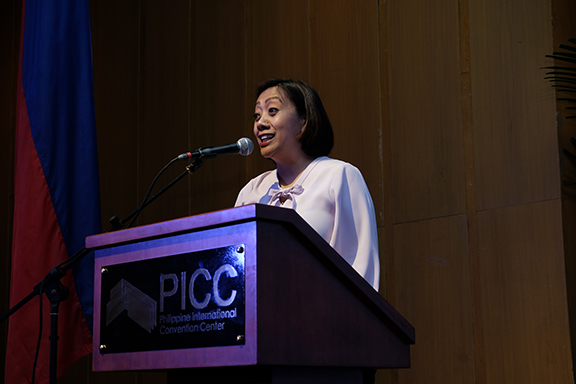
Meanwhile, Representative Maria Lourdes Acosta-Alba who chairs the House Committee on Women and Gender Equality pledged her commitment for the WPLA. She also shared efforts to infuse gender sensitivity trainings and to create a Gender and Development Focal Point System in the Lower House.
“I pledge my fullest support to the PCW and the prioritized bills that are included in the PCW legislative agenda. These will also be considered as priority legislative agenda of our Committee. Let us continue to fight for women’s rights and gender equality,” said Acosta-Alba.
To signify their support for the WPLA, the attendees participated in the pinning ceremony of the Agenda ni Juana advocacy pin during the program.
In closing, PCW Commissioner Noreen B. Capili shared that the journey towards the passage of the bills in the WPLA is still long, and while it is good to know that there are legislators who fully support the agenda, the other stakeholders has to be mobilized to support these as well.
“We have demonstrated in the past that if we lobby and fight together we will be able to attain our goals. The power of advocacy and lobbying is proven when we pushed for they passage of the Magna Carta of Women, the Responsible Parenthood and Reproductive Health Act, the Expanded Maternity Leave Act, and just recently the Safe Spaces Act,” Capili noted.
She challenged both the legislators and the participants from government and non-government sectors to work together for Agenda ni Juana.
The Women’s Priority Legislative Agenda
The WPLA, particularly those that seek to amend the discriminatory provisions of existing laws, is anchored on Section 12 of the Magna Carta of Women which mandated the review and amendment of such policies. The proposed measures are also part of the Legislative Agenda under the Philippine Development Plan 2017-2022.
The current set of agenda is the fruit of a series of consultations involving local women’s groups in three key cities in Luzon, Visayas, and Mindanao and a careful discussion based on specific criteria to address women and gender equality issues and concerns across the country.
The WPLA is comprised of ten proposed measures:
1. Strengthening the Provisions of R.A. No. 8353: Amending the Anti-Rape Law
This aims to redefine rape by putting the element of lack of consent at its center, so that the crime is deemed committed if the acts were done without the victim’s consent, whether or not injuries were suffered. It is also proposed that the age of statutory rape be increased from the current 12 years old to at least 16 years old. This would mean that only upon reaching 16 years old that a person can be legally deemed mature enough to give sexual consent to another person. Under this agenda as well is the repeal of the forgiveness clause so the subsequent valid marriage of the offended party and offender would not extinguish the latter’s liability.
2. Repealing the Revised Penal Code provisions on Adultery and Concubinage
The measure targets the repeal of Articles 333 and 334 in the Revised Penal Code. The end in view is to change the definitions of adultery and concubinage. Although these both refer to marital infidelity, the burden is greater for the wives in terms of the evidence needed and the penalties imposed mainly due to the disparity of the crimes’ definitions.
3. Ensuring Women’s Equal Rights in Marriage and Family Relations
In amending Articles 14, 96, 124, 211 and 225 of the Family Code of the Philippines, spouses shall have equal rights with respect to their ability to provide parental consent to marry, administer their community property or conjugal partnership, exercise parental authority over the person and legal partnership over the property of common children will be removed.
4. Recognizing Sexual Abuse and Focusing on the Violence and Abusive Conduct as Grounds for Legal Separation
This gives the rationale in amending the Family Code by focusing on the violence and abusive conduct as grounds for legal separation as well as recognizing sexual abuse. Currently, under Article 55 of the Family Code, only when the physical violence is “repeated” and the abusive conduct is “gross” can the woman cite these acts as causes in filing for legal separation. Through this measure, the focus will be on the acts committed and not on the severity or instances of the violence and abuse.
5. Enacting the Anti-Prostitution Law
By amending Articles 202 and 341 of the Revised Penal Code, prostitution which promotes sexual exploitation and violence against women will be recognized as a human rights violation. The recommendations revolve around treating women in prostitution not as criminals but victims, criminalizing those who exploit people in this illicit trade, and establishing support mechanisms for prostituted persons so they can be freed from the system.
6. Upholding the Right to Life and Security of Spouses and Daughters by Repealing Article 247 of the Revised Penal Code
The proposed legislation’s objective is to repeal Article 247 of the Revised Penal Code which exempts a spouse or parent who inflicts harm or even death upon the other spouse or minor daughter caught having sexual intercourse with another person. This old view is based on honor-based violence, which is committed against women under the pretext that the honor of the family must be protected and that the woman must preserve her virginity or conform with patriarchal standards of sexual behavior.
7. Enacting a Women’s Political Participation and Representation Law
While the number of women leaders have increased in the span of 1998 to 2016 from 16.1% to 21.44%, the progress in this sphere is still slow and inadequate. Now, women comprise only one-fifth of government-elected positions. Thus, under this proposal, the PCW recommends the adoption of a gender quota and other actions that will provide opportunities for women to be elected into public office and contribute in nation building.
8. Enacting a Law Prohibiting Discrimination Based on Sexual Orientation, Gender Identity and Expression (SOGIE)
This recognizes that people of diverse sexual orientation, gender identity and expression should not be just accepted but more importantly, protected. SOGIE aims to penalize discriminatory acts that exclude them from full and meaningful participation in work, education, and training institutions and that hinder them from accessing basic services.
9. Adopting Divorce in the Family Code
The PCW supports the adoption of divorce in the Family Code to allow the dissolution of abusive and dysfunctional marriages which are irreparable. The Philippines is the only country, apart from the Vatican, which does not have an applicable divorce law. If enacted, this will permit divorce based on grounds for legal separation under the same law, allow divorced spouses to remarry, and grant women the right to initiate divorce on the same terms as men.
10. Enacting a Magna Carta of Workers in the Informal Economy
Women are more often to be engaged in vulnerable and low-paying kinds of work, such as domestic workers, street vendors or self-employed home-based workers. This calls for a law that will protect their labor rights, provide sufficient social protection and decent work.
The need to push for Agenda ni Juana
During the program, Ms. Asliah Limbona, Chairperson of the Association of Divorce Women Empowerment, shared misconceptions about the pending divorce bill, saying that it is not anti-religion or anti-family, but is rather, a right.
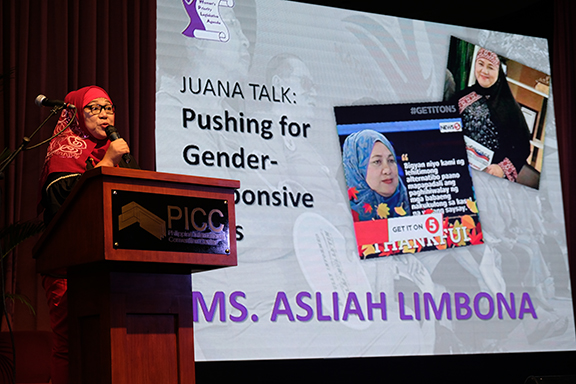
She noted that women who are trapped in an abusive relationship should be given the chance to move on, and possibly take a second chance at finding a better partner.
“I am a happily married woman, yet I am supporting this Divorce advocacy because we should make a difference and make our voices heard as we stand for other Juanas,” she shared.
In a media interview during the event, Senator Hontiveros said that the launch of the WPLA is timely since the period of another legislative battle has just begun. She expressed hope for high motivation and inspiration by the stakeholders.
“Lalo nating palawakin at patatagin ang ating pagkakaisa to really bring these advocacies, these bills, to the priority attention of my fellow legislators. I think we have support to begin with. Siyempre, tulad ng anumang bill, ang bawat priority bill natin ay maaaring may opposition pero handa naman tayong humarap sa interpellation, so i-push natin ng malakas hanggang mapagbotohan ang mga ito, and let it be a legacy na iiwan ng mga babae sa 18th Congress inside and outside the Congress of the Republic,” Hontiveros said.
The PCW hopes that these bills will be approved during the 18th Congress despite the fact that men still outnumber women in the Legislative branch. Only seven out of twenty-four senators are female, while only 65 out of 237 members of the House of Representatives are women.
During the 17th Congress, two of PCW’s WPLA were enacted into law: the Expanded Maternity Leave Act and the Safe Spaces Act.

